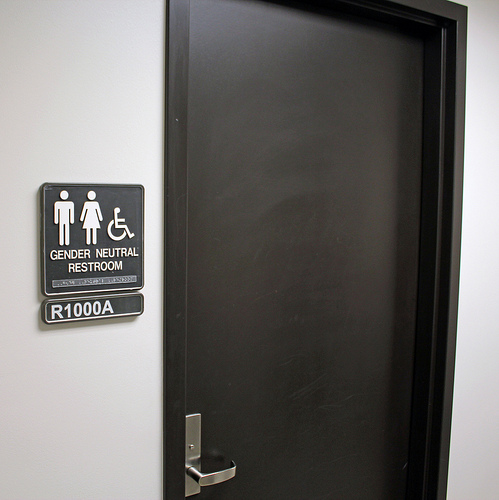Using a public washroom isn’t something most folks whose gender identity matches the gender they were assigned at birth ever really think about. This privilege is not shared by trans* people. For people who don’t conform to gender norms, whose gender isn’t man or woman or even trans* people who don’t pass as their desired gender, choosing which bathroom to use is all too often a lose-lose situation.
Many trans* people face harassment at best. According to a 2013 study, 68 per cent of trans* people were told they were in the wrong facility, ridiculed, told to leave, verbally threatened or gawked at. Nine per cent of trans* people were sexually assaulted or subject to physical violence just for going to a gender segregated bathroom. The fear, stress and real potential for violence associated with using gender segregated bathrooms can be so great that it can actually limit the participation of trans* folks in everyday life. Fifty-seven per cent of trans* Ontarians have avoided public washrooms, which can result in health conditions ranging from urinary tract infections to kidney problems.
The core of this issue is transphobia. Whenever the option of gender-neutral bathrooms is discussed, without fail, a vocal contingent of seemingly well-meaning folks rear their heads to argue the same tired myths. The notion that gender-neutral bathrooms can’t exist because of the theoretical threat of violence to cisgender women and children silences and erases the real probability of violence that trans* people experience when they enter a bathroom. The idea that a gendered sign on a washroom door will stop a predator in their tracks has not proven true.
Single-stall, accessible washrooms are a viable solution for businesses, schools and municipalities. These bathrooms can be accessible to people with disabilities and marked as gender neutral. Just as inaccessible bathrooms act as a barrier for people with disabilities, gender-segregated bathrooms are a barrier to trans* people. To truly make society inclusive for trans* people, gender-neutral bathrooms need to become a priority in all public spaces.
There have been some amazing strides in the last few months in Vancouver. In late April, Vancouver Parks and Recreation adopted many of the recommendations of its Trans* and Gender Variant working group including introducing properly signed gender neutral washrooms. The Vancouver School Board (VSB) received similar feedback from its PRIDE advisory committee, hoping to update a decade old policy on LGBTQ students. The highlights of the new policy include: making trans*-positive resources available in school libraries in multiple languages, respecting the chosen name and pronoun of trans* people and mandating that gender-neutral bathrooms be available for trans* students.
The simple request to take a stance against transphobia in schools by respecting and creating accessible bathrooms for trans* students has ballooned out of the VSB meeting last Wednesday and into the realm of public opinion. The policy, originally thought to be implemented as early as May 20, will now endure another round of community critique on June 11.
While opponents claim that there needs to be more research done into the policy, there have been multiple, significant studies into how trans* youth experience violence at school. In Egale Canada’s 2009 School Climate Survey 95 per cent of trans* youth said they felt unsafe in their school. Ninety per cent had faced harassment at school because of their gender identity. Half of all trans* students who reported the incident to school staff saw no action taken on their behalf. A 2010 Transpulse study found that 19 per cent of trans* youth in Ontario over the age of 16 avoided school due to fear of harassment.
A massive barrier to feeling welcome at school is not having access to the most basic resources. We know the risks for trans* people when they are forced to use gender-segregated bathrooms The issue of gender-neutral bathrooms in schools doesn’t need more research. What we need is for cisgender opponents to check their privilege and respect trans* people as people.
Tools for trans* accessible bathrooms
Refuge Restroom: An app to help trans* folks find gender neutral bathrooms
Free to Pee GBC: A Toronto-based resource on creating accessible bathrooms



